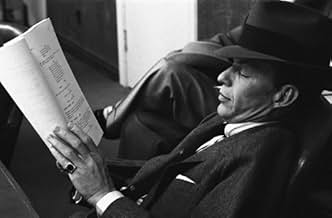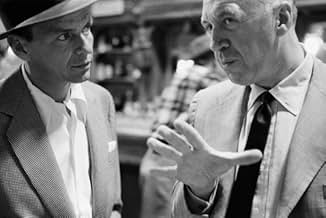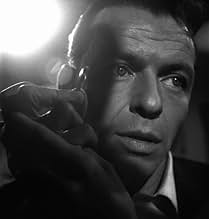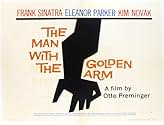IMDb रेटिंग
7.3/10
13 हज़ार
आपकी रेटिंग
अपनी भाषा में प्लॉट जोड़ेंA junkie must face his true self to kick his drug addiction.A junkie must face his true self to kick his drug addiction.A junkie must face his true self to kick his drug addiction.
- 3 ऑस्कर के लिए नामांकित
- 3 जीत और कुल 8 नामांकन
Jered Barclay
- Junkie in Lock-Up
- (बिना क्रेडिट के)
Leonard Bremen
- Cabbie in Lock-Up
- (बिना क्रेडिट के)
Paul E. Burns
- Suspenders in Lock-Up
- (बिना क्रेडिट के)
Pete Candoli
- Jazz Musician
- (बिना क्रेडिट के)
Herschel Graham
- Club Safari Patron
- (बिना क्रेडिट के)
Harold 'Tommy' Hart
- Officer Kvorka
- (बिना क्रेडिट के)
फ़ीचर्ड समीक्षाएं
The Man with the Golden Arm was one of the first films to have as its main topic (and, in some respects, the message) the tragedy of heroin addiction. It's nowhere near a great film, but its importance lies in Otto Preminger's dedication to making it feel real and on the edge of melodrama and naturalism. What I liked is that it's not so much an expose of junkies (if you want the best expose of that read Naked Lunch, if you can get through it anyway, besides the point), but the nature of the urban environment Frankie Machine lives. He expects after he gets out of prison for dealing to go on the straight and narrow, to become a drummer in a band and make it legit as a musician. But he has his "crippled" wife Zosch, who can't work and needs money and often complains, and then there's the old neighborhood- he can't escape seeing Louie (Darren McGavin), who is still doing back-room card games and, yes, pushing dope. Like Mean Streets, it's hard to escape the minutia unless you leave.
But then again, it's hard for Frankie Machine not to try and operate naturally in this urban quarter. It's just that he can't escape the temptation of junk (when he's booked on a phony theft charge with his friend, he sees a junkie freaking out, and it puts back the fear of going back on into his clean self). And personifying Frankie is Sinatra, and I can't see anyone else who could've played him, even original choice Brando. He fits into the neighborhood, and seems like the kind of guy who should be a step ahead of the game. But there's also a vulnerability to Sinatra that he pulls out wonderfully, and by the time we see him going 'cold turkey' in Molly's apartment, it's believable even if it's not the kind of thing those from 'my' generation would think of heroin (i.e. Trainspotting and certainly Requiem for a Dream). If for nothing else, you want to watch the movie to see what happens to Sinatra as this character.
The flaws, however, come in some of the other performances, though it's a little tricky. Eleanor Parker seems to be overacting for a good portion of the movie, fooling Frankie that she's really crippled when in reality she can walk and is fooling him for one reason or another. But then it becomes clearer as it goes along- she's supposed to be nuts, and nuts with jealousy, and on that level it starts to get better. Meanwhile, Kim Novak is good, though not Vertigo-worthy, as the possible girl in the side but more like the voice of reason in the story. Then there's a Detective Bendar, who might be one of the most one-note characters/performances, ever. And also Sparrow, Frankie's nerdy friend, and the characters of Louie and Schiefka, and they're all played as one might expect them to (actually, McGavin is better than OK). As far as casting other talent around Sinatra, Preminger doesn't do all that great. And, frankly, some scenes kind of fall flat.
But there's a lot of fascination in the Man with the Golden Arm, and not just as some dated piece of sociological interest. It works as compelling drama, and as a message piece conveyed without being preachy or campy. It's a genuine article, just not exceptional.
But then again, it's hard for Frankie Machine not to try and operate naturally in this urban quarter. It's just that he can't escape the temptation of junk (when he's booked on a phony theft charge with his friend, he sees a junkie freaking out, and it puts back the fear of going back on into his clean self). And personifying Frankie is Sinatra, and I can't see anyone else who could've played him, even original choice Brando. He fits into the neighborhood, and seems like the kind of guy who should be a step ahead of the game. But there's also a vulnerability to Sinatra that he pulls out wonderfully, and by the time we see him going 'cold turkey' in Molly's apartment, it's believable even if it's not the kind of thing those from 'my' generation would think of heroin (i.e. Trainspotting and certainly Requiem for a Dream). If for nothing else, you want to watch the movie to see what happens to Sinatra as this character.
The flaws, however, come in some of the other performances, though it's a little tricky. Eleanor Parker seems to be overacting for a good portion of the movie, fooling Frankie that she's really crippled when in reality she can walk and is fooling him for one reason or another. But then it becomes clearer as it goes along- she's supposed to be nuts, and nuts with jealousy, and on that level it starts to get better. Meanwhile, Kim Novak is good, though not Vertigo-worthy, as the possible girl in the side but more like the voice of reason in the story. Then there's a Detective Bendar, who might be one of the most one-note characters/performances, ever. And also Sparrow, Frankie's nerdy friend, and the characters of Louie and Schiefka, and they're all played as one might expect them to (actually, McGavin is better than OK). As far as casting other talent around Sinatra, Preminger doesn't do all that great. And, frankly, some scenes kind of fall flat.
But there's a lot of fascination in the Man with the Golden Arm, and not just as some dated piece of sociological interest. It works as compelling drama, and as a message piece conveyed without being preachy or campy. It's a genuine article, just not exceptional.
I've always enjoyed Frank Sinatra's music, and just recently I wrote a term paper about his life story. I've been fascinated by the life and legend of Ol' Blue Eyes. However, I've never seen any of his movies. So I wanted to see if his acting was as great as his singing. Well...it was! I was blown away by his performance in this movie! He really does a tremendous job as recovering heroin addict Frankie Machine, who's trying to put his life back together and audition as a drummer for a local band.
Otto Preminger's direction is great as well. I haven't seen any of his other movies. I read his biography on the IMDB. He seems like one of those directors who was sorely misunderstood, and people had conflicted thoughts about him. Seems like the kind of person who appeals most to cult enthusiasts. I haven't seen enough of his films to know for sure if he's really brilliant, but now I'm curious. I want to see more of his films, because judging by his attempt with "The Man with the Golden Arm" this guy has talent. I also loved the music for this movie. The score definitely contains the kind of music that I'll remember if I ever happen to hear it again. That's when you know you have a great score.
The supporting performances are fine as well, including Darren McGavin as the local drug pusher, Eleanor Parker as Frankie's wheelchair-bound wife and Kim Novak as his lover.
It's interesting to see how filmmakers handled the subject of drug abuse, as opposed to modern attempts in films like "Trainspotting" and "Requiem for a Dream." Back in 1955, just mentioning the word "drugs" caused controversy, and if you watch the film they kept the subject on a very discreet level. There's only one scene where Frankie is actually getting heroin injected into his arm, and they showed a close-up of the reaction of his face rather than showing the needle graphically poking into his veins. But it delivered its message without making it feel watered-down. In a powerful drama like this, with powerful performances and direction like this, you don't need graphic portrayals of drug abuse to keep the audience intrigued.
"The Man with the Golden Arm" is a dramatic gem that all film buffs should check out. It really is an amazing piece of work!
My score: 8 (out of 10)
Otto Preminger's direction is great as well. I haven't seen any of his other movies. I read his biography on the IMDB. He seems like one of those directors who was sorely misunderstood, and people had conflicted thoughts about him. Seems like the kind of person who appeals most to cult enthusiasts. I haven't seen enough of his films to know for sure if he's really brilliant, but now I'm curious. I want to see more of his films, because judging by his attempt with "The Man with the Golden Arm" this guy has talent. I also loved the music for this movie. The score definitely contains the kind of music that I'll remember if I ever happen to hear it again. That's when you know you have a great score.
The supporting performances are fine as well, including Darren McGavin as the local drug pusher, Eleanor Parker as Frankie's wheelchair-bound wife and Kim Novak as his lover.
It's interesting to see how filmmakers handled the subject of drug abuse, as opposed to modern attempts in films like "Trainspotting" and "Requiem for a Dream." Back in 1955, just mentioning the word "drugs" caused controversy, and if you watch the film they kept the subject on a very discreet level. There's only one scene where Frankie is actually getting heroin injected into his arm, and they showed a close-up of the reaction of his face rather than showing the needle graphically poking into his veins. But it delivered its message without making it feel watered-down. In a powerful drama like this, with powerful performances and direction like this, you don't need graphic portrayals of drug abuse to keep the audience intrigued.
"The Man with the Golden Arm" is a dramatic gem that all film buffs should check out. It really is an amazing piece of work!
My score: 8 (out of 10)
Sinatra is thoroughly convincing as the addict in this grim horror story of what life is like for someone who has lost his soul to drugs. This is film noir made even more noir by the drab sets and lighting. We go through the terrifying experience of a man who is trying to escape from the monster he has placed on his own back.
Elmer Bernstein's score is a mixture of jazz and symphony that makes the addict's frightful journey even more believable to the audience.
This film opened the topic of drug addiction the way LOST WEEKEND broached the subject of alcoholism. At least people could talk about these addictions a little more freely.
Elmer Bernstein's score is a mixture of jazz and symphony that makes the addict's frightful journey even more believable to the audience.
This film opened the topic of drug addiction the way LOST WEEKEND broached the subject of alcoholism. At least people could talk about these addictions a little more freely.
A strung-out junkie (Frank Sinatra) deals with daily demoralizing drug addiction while crippled wife (Eleanor Parker) and card sharks continue to pull him down.
While this is not the first film to deal with drugs, it is probably the first to deal with them in a very serious manner. "Reefer Madness" and "Cocaine Fiends", for example, can be written off as humorous nostalgia. This film, on the other hand, is decades ahead of "Trainspotting" and "Requiem For a Dream". (Did you even know heroin addiction was prominent in the 1950s?)
Variety called the film "a gripping, fascinating film, expertly produced and directed and performed with marked conviction by Frank Sinatra as the drug slave." I agree for the most part, though I really did not enjoy Sinatra's acting as much as many others did, I think. Otto Preminger is a first-rate director, and I hope this film gets the respect it deserves over the long run (I found the 50th anniversary release to be not nearly cleaned up enough).
While the focus is heroin and addiction, one could also make a case about this film being about love. Frankie's wife brings him down, encourages him to go back to his old habits, turns him away from his dreams. Molly (Kim Novak) does just the opposite. Divorce and adultery are hardly ever positive topics, but in this film you almost hope that Frankie goes that route.
While this is not the first film to deal with drugs, it is probably the first to deal with them in a very serious manner. "Reefer Madness" and "Cocaine Fiends", for example, can be written off as humorous nostalgia. This film, on the other hand, is decades ahead of "Trainspotting" and "Requiem For a Dream". (Did you even know heroin addiction was prominent in the 1950s?)
Variety called the film "a gripping, fascinating film, expertly produced and directed and performed with marked conviction by Frank Sinatra as the drug slave." I agree for the most part, though I really did not enjoy Sinatra's acting as much as many others did, I think. Otto Preminger is a first-rate director, and I hope this film gets the respect it deserves over the long run (I found the 50th anniversary release to be not nearly cleaned up enough).
While the focus is heroin and addiction, one could also make a case about this film being about love. Frankie's wife brings him down, encourages him to go back to his old habits, turns him away from his dreams. Molly (Kim Novak) does just the opposite. Divorce and adultery are hardly ever positive topics, but in this film you almost hope that Frankie goes that route.
We have moved far beyond this tentative foray into a forbidden area-drug addiction-for the 1950s. As such, the film may seem dated. The Man with the Golden Arm served its function is peeling back a layer of the underside of society, an eye-opener to a Southern country boy in 1955 when I first viewed this film in the theater. After some serious consideration about being too young, I was allowed to go. It was powerful and affecting then and still maintains some sharp, painful moments of the soul stripped naked. As a movie depicting the loneliness at the core of being, it succeeds.
Filled with angst, Frank Sinatra, in his best role, creates a vulnerability that makes him sympathetic to the viewer. He conveys his helplessness and ineffectualness in a beautifully restrained performance. As a voice of common sense in the dead-end urban jungle, Kim Novak as Molly is quite good. She is compassionate and yet stands on solid ground. The interaction between Sinatra and Novak is really good. Darren McGavin plays a slimy character and does it very well. Eleanor Parker is superbly irritating and painfully insecure in her role of the pathetic Zosch, the crippled wife of Sinatra. Arnold Stang is another unlikely survivor of the street. Regarded as pitiful and despicable, his character Sparrow provides tart comedic moments.
The music is almost the star of this film-brooding, frenetic, moody, poignant. Elmer Bernstein's score perfectly accentuates the tensions of Frankie Machine's spiritual weakness and physical need for heroin. Molly's theme is bittersweet and captures aurally what the film depicts visually. I know of no other soundtrack that effectively complements the tension and defeat within a man as effectively as does this one.
Filled with angst, Frank Sinatra, in his best role, creates a vulnerability that makes him sympathetic to the viewer. He conveys his helplessness and ineffectualness in a beautifully restrained performance. As a voice of common sense in the dead-end urban jungle, Kim Novak as Molly is quite good. She is compassionate and yet stands on solid ground. The interaction between Sinatra and Novak is really good. Darren McGavin plays a slimy character and does it very well. Eleanor Parker is superbly irritating and painfully insecure in her role of the pathetic Zosch, the crippled wife of Sinatra. Arnold Stang is another unlikely survivor of the street. Regarded as pitiful and despicable, his character Sparrow provides tart comedic moments.
The music is almost the star of this film-brooding, frenetic, moody, poignant. Elmer Bernstein's score perfectly accentuates the tensions of Frankie Machine's spiritual weakness and physical need for heroin. Molly's theme is bittersweet and captures aurally what the film depicts visually. I know of no other soundtrack that effectively complements the tension and defeat within a man as effectively as does this one.
क्या आपको पता है
- ट्रिवियाFrank Sinatra jumped at a chance to star in the film before reading the entire script.
- गूफ़In a scene about twenty minutes in, as the camera exits the bar following Frankie, the jukebox can be seen to slide out of the way of the camera at the bottom of the screen.
- कनेक्शनEdited into Bass on Titles (1982)
टॉप पसंद
रेटिंग देने के लिए साइन-इन करें और वैयक्तिकृत सुझावों के लिए वॉचलिस्ट करें
- How long is The Man with the Golden Arm?Alexa द्वारा संचालित
विवरण
- रिलीज़ की तारीख़
- कंट्री ऑफ़ ओरिजिन
- भाषा
- इस रूप में भी जाना जाता है
- El hombre del brazo de oro
- फ़िल्माने की जगहें
- उत्पादन कंपनी
- IMDbPro पर और कंपनी क्रेडिट देखें
बॉक्स ऑफ़िस
- बजट
- $10,00,000(अनुमानित)
- दुनिया भर में सकल
- $4,652
- चलने की अवधि1 घंटा 59 मिनट
- रंग
- पक्ष अनुपात
- 1.85 : 1
इस पेज में योगदान दें
किसी बदलाव का सुझाव दें या अनुपलब्ध कॉन्टेंट जोड़ें

टॉप गैप
By what name was The Man with the Golden Arm (1955) officially released in India in English?
जवाब



































